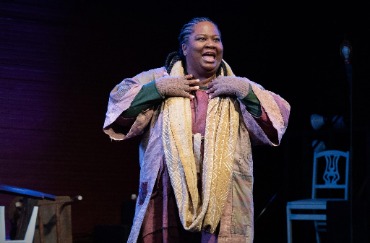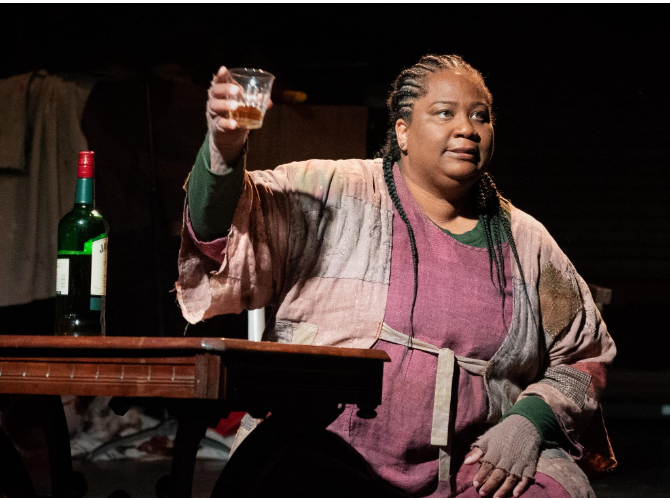Ancram Opera House, Ancram, NY
An Iliad, by Lisa Peterson and Denis O'Hare
Directed by Jeffrey Mousseau. Reviewed by J. Peter Bergman
"I told you so!"
On the third night of the Hunters Moon the Poet entered the deserted theatre stage at the Ancram Opera House to tell the story of war that Homer wrote about in The Iliad. This time she sang the tale of anger, frustration and regret in a way that is so compelling that we couldn't turn away of ignore all of implications about the time we live in where it seems we have never learned the lessons of the past or projected them into our future. I have seen this play four time before this one and it has always impressed me as an accomplishment for the actor, male or female. This time the play felt like reality as MaConnia Chesser undertook the challenges of the storyteller whose vision of complexity was to do just what the story demands: Tell it clearly, contain your emotions but tell the story of what war is about. Telling the story is what she does; emotion colors the telling, however, and when she finally reached that point where response is more important than reporting, the show of relating facts became the horror story of our life today as the poet's litany of war, of how it has developed and come forward in time, ending with Afghanistan. Always the high point of the play for me, this time it was devastating.
The Hunters Moon, though not an image within the confines of the theater, should be an image for this play in the future. It is a symbol of the urge to gather supplies to sustain us for the long, bleak winter ahead, just as this script by Lisa Peterson and Denis O'Hare is a symbol of the self-destructive nature of mankind. The unanticipated juxtaposition of the two things brought me up short. I had never conceived of my place, our place, in the world's tragic history. The language here, both simple yet complex and poetic, provided me with the pain of reality and the beauty of tradition. Chesser makes the language sing as she falls into Greek and Aramaic when she cannot speak in English. Her tongue and her mind wander but always en route to a modern reality. Her Poet has told this story everywhere, all around the globe, hoping to alleviate both our pain at our past and a reluctance to pursue this course in the future.

MaConnia Chesser; Photo: B. Docktor

MaConnia Chesser as The Poet; Photo: B. Docktor
Chesser is quite an actor. In establishing her role as The Poet, she removes all gender from her being and becomes an entity charged with the Gods-given duty to speak to people for centuries about the essence of war, about its origins and its devastating aftermath. She becomes the human edition of the book, almost devoid of personality and bias. Her Poet has a responsibility to alert humanity and this is done through the tale itself. She is not involved, though the remarkable use of inflection in the voice shows that to be a lie. We wonder how much longer she can wander the earth telling this story to groups of people who cannot seem to grasp its importance. Chesser compels us to understand the difficulty of preaching to a choir that cannot harmonize with her forceful and straightforward tune. Nothing about the Poet's frustration is said, but it is felt. Deeply felt. Playing these opposing objects, telling the stories of varied viewpoints, of Achilles and Hector. of Helen and Andromache, of Agamemnon and Zeus, must be exhausting; it is for us in the dark watching and listening, stretching into the unfamiliar and unknown.
Director Jeffrey Mousseau has worked with the actress to create a reality that cannot be avoided. His stage set, designed by Sarah Edkins shows us the result of our own time and its destruction of a theater in the time of pandemic: stools, chairs, props are strewn about the abandoned stage; a piano remains unplayed in a corner. The unsettling lighting of the show has been designed by James McNamara echoing the lighting of that orange moon against the hills outside. MaConnia Chesser's costume, a traveling shift, has been created by costume designer Denise R. Massman and its color continues the theme of the eternal aspects of the story of an Iliad. The amazing immortal sound design by Alexander Sovronsky may be his finest work to date. Mousseau and Chesser work within these excellent technical aspects and, of course, through the script to create something very special. An Iliad is more than a story; it is an adventure in theatrical terms. This fifth exposure for me to this play must be my last one for no one can do it better. Ever.
+ 10/22/2021 +
An Iliad plays through October 31 at the Ancram Opera House, 1330 County Routs 7, Ancram NY (just SW of Copake (take route 7A to Route 7). For information and tickets contact the Ancram Opera House at https//app.arts-people.com/index.phpsticketing-aoh